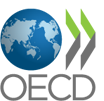OECD: Difference between revisions
No edit summary |
Dustin Loup (talk | contribs) No edit summary |
||
| (4 intermediate revisions by 2 users not shown) | |||
| Line 1: | Line 1: | ||
{{CompanyInfo| | {{CompanyInfo| | ||
| logo = oecd.png | | logo = oecd.png | ||
| Line 9: | Line 6: | ||
| founders = | | founders = | ||
| ownership = | | ownership = | ||
| headquarters = Paris | | headquarters = Paris | ||
| country = | | country = France | ||
| businesses = | | businesses = | ||
| products = | | products = | ||
| Line 23: | Line 20: | ||
}} | }} | ||
'''Organization for Economic Co-operation and Development (OECD)''', which encourages the development of new and enhanced economic policies for the social well-being of people around the globe. It provides a forum for the governments of developed nations and developing nations to work together to share experiences and seek solutions to common issues.<ref>[http://www.oecd.org/pages/0,3417,en_36734052_36734103_1_1_1_1_1,00.html oecd.org]</ref> | |||
==History== | ==History== | ||
| Line 38: | Line 35: | ||
* To set international standards on various services and products ranging widely from safety of nuclear power plants to standard tomato quality and from education of the country’s youth to the pension plan to support the senior citizens. | * To set international standards on various services and products ranging widely from safety of nuclear power plants to standard tomato quality and from education of the country’s youth to the pension plan to support the senior citizens. | ||
* To design and recommend policies for enhancing the life of the common people.<ref>[http://www.oecd.org/pages/0,3417,en_36734052_36734103_1_1_1_1_1,00.html oecd.org]</ref> | * To design and recommend policies for enhancing the life of the common people.<ref>[http://www.oecd.org/pages/0,3417,en_36734052_36734103_1_1_1_1_1,00.html oecd.org]</ref> | ||
==ICANN and OECD== | ==ICANN and OECD== | ||
| Line 44: | Line 40: | ||
== References == | == References == | ||
{{reflist}} | {{reflist}} | ||
[[category: | [[category: Organizations]] | ||
__NOTOC__ | __NOTOC__ | ||
Latest revision as of 21:22, 11 October 2017
 | |
| Type: | Public |
| Industry: | Economy |
| Headquarters: | Paris |
| Country: | France |
| Employees: | 2500 |
| Revenue: | €342 million |
| Website: | oecd.org |
| Facebook: | OECD |
| Twitter: | |
| Key People | |
| Angel Gurría, Secretary-General | |
Organization for Economic Co-operation and Development (OECD), which encourages the development of new and enhanced economic policies for the social well-being of people around the globe. It provides a forum for the governments of developed nations and developing nations to work together to share experiences and seek solutions to common issues.[1]
History
The organization for European Economic Co-operation (OEEC) was formed after the Second World War for the economic development and stabilization of European countries which were under financial crisis after the war. The OEEC also worked to avoid the post-World War I mistakes of punishing the defeated, in order to ensure long lasting peace in the continent. It was established in 1947 to assist and support the Marshall Plan to reconstruct and redevelop the European continent, which was completely destroyed by the Second World War. It invoked a sense of unity and cooperation between the European countries by making them realize the economies of all European countries are interdependent on each other.
Overwhelmed by the success of OEEC in the development of financial stability and maintaining peace in the European continent, United States and Canada joined OEEC as new members. With the inculcation of these new members, OEEC increased its prospects from Europe to the entire world. This gave rise to a new organization known as OECD (Organization for European Cooperation and Development), which was officially formed on 30 September 1961. There are now 34 member countries associated with the OECD, and through the "enhanced engagement" program countries like Brazil, China, India, Indonesia and South Africa have close relations with OECD. Currently there are 40 countries, which account for 80% of the world trade and investment, making OECD a prime authority in addressing the challenges related to the world economy. [2]
Mission of OECD
- To promote policies for improving the economic conditions of countries across the globe.
- To provide a platform for countries with common economic problems to work together and solve their problems.
- To provide a platform for developed countries to share their experiences and provide appropriate recommendations to developing countries facing economic problems.
- To assist different governments in analyzing the various reasons for economic, social and environmental changes in their countries.
- To assist with research and analysis for measuring the productivity of world trade and investment, as well as predicting the future trends.
- To set international standards on various services and products ranging widely from safety of nuclear power plants to standard tomato quality and from education of the country’s youth to the pension plan to support the senior citizens.
- To design and recommend policies for enhancing the life of the common people.[3]
ICANN and OECD
OECD acts as an advisor for ICANN in its various economic policies regarding TLDs and other internet-related services. It also aims to provide an overview of the structure of the market for gTLDs and also to review reforms introduced by ICANN and their impact on the market. It also recommends ICANN on various procedures and reforms that ICANN can implement to efficiently use its resources.[4][5][6][7]
